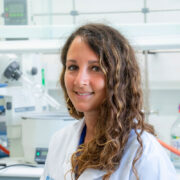
Biographical notes
Dr. Simona Di Martino is working at Ri.MED Foundation since 2020, as a Senior Scientist in the medicinal chemistry group, under the guidance of the Principal Investigator, Dr. Maria De Rosa. She graduated cum laude in Chemistry and Pharmaceutical Technologies at Palermo University and completed her doctoral studies at the same University, under the supervision of Prof. Alessandra Montalbano, obtaining the title of Doctor Europaeus in Pharmaceutical Sciences.
During her doctoral studies, she had the opportunity to join the Welsh School of Pharmacy at Cardiff University, having Prof. Andrew Westwell as a co-supervisor. She mainly worked on the synthesis and characterization of aromatic heterocyclic scaffold molecules, with potential antitumor activity. Subsequently, at the Department of Drug Discovery and Development (D3-Unit) of the Italian Institute of Technology (IIT), in Genoa, she worked as a postdoctoral researcher in the medicinal chemistry group, under the guidance of Dr. Rita Scarpelli. In a multidisciplinary and international context, she had the privilege to participate in a lead optimization project, funded by the US Biotech Lysosomal Therapeutics Inc. Main expertise consists in the design, synthetic routes planning, synthesis, and structural characterization of new molecules with potential anti-inflammatory and neuroprotective activity. At Ri.MED is also supervising the wet laboratory activities.
Scientifical activity
Dr. Simona Di Martino’s training as a medicinal chemist began with her master’s thesis focused on the synthesis and characterization of new azaindole derivatives of Nortopsentin D, as potential antitumor inhibitors targeting the cyclin-dependent kinase 1 (CDK1).
Her Ph.D. thesis focused on the design, synthesis, and characterization of derivatives naphthyridine-structure based, with potential inhibitory activity against mTOR (mammalian Target Of Rapamycin), a target involved in the PI3K/Akt pathway. This protein shows a regulatory function in several processes, such as cell growth and proliferation, and seems to be involved in the onset of various human tumors (breast, prostate, lungs, liver, and kidneys).
In the group of Prof. Andrew Westwell, she had the opportunity to deepen her skills in the cancer therapeutic area and she contributed to a drug discovery project on B-cell lymphoma 3-encoded protein (Bcl3). During the postdoctoral studies (2015-2020), the scientific activity was focused on neurodegeneration and the project of interest related to lysosomal disorders. She participated in hit-to-lead and lead optimization projects, with the synthesis of derivatives targeting the N-acyl ethanol acid amine amidase (NAAA) and acid ceramidase (AC). More in detail, AC is a lysosomal enzyme that plays a key role in the metabolism of ceramides and glucosylceramides and its malfunctioning seems to be correlated to several neurodegenerative diseases. The aim of the project was the structural optimization of AC inhibitors as potential drug candidates for the treatment of lysosomal diseases. Since 2020, she has been working at Ri.MED Foundation, where she is actively engaged with a drug discovery project aiming at identifying novel NLRP3 modulators (inflammation area). She is also approaching peptidomimetics chemistry and she recently contributed to the release of a perspective on this topic, together with the Medicinal Chemistry people team.
